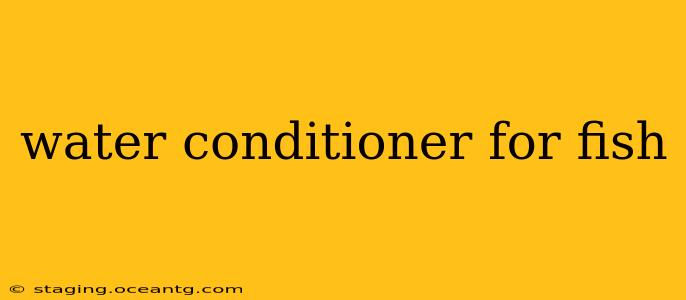Keeping fish happy and healthy requires more than just a pretty tank and colorful fish. Maintaining optimal water quality is crucial, and that's where water conditioners come in. This comprehensive guide will explore everything you need to know about water conditioners for fish, helping you create a thriving underwater world.
What is a Water Conditioner for Fish?
A water conditioner is a vital tool for any fish keeper. It's a product designed to neutralize harmful substances in tap water before it enters your aquarium. Tap water often contains chlorine, chloramine, heavy metals, and other impurities that can be toxic to fish. Water conditioners work by binding to or removing these harmful elements, making the water safe for your aquatic friends.
Why Use a Water Conditioner?
Using a water conditioner is not optional; it's essential for the health and well-being of your fish. Ignoring this step can lead to a range of problems, including:
- Toxicity: Chlorine and chloramine are common disinfectants added to tap water to kill harmful bacteria. While effective for humans, these chemicals are highly toxic to fish, even in small concentrations.
- Stress: Exposure to harmful chemicals stresses fish, weakening their immune systems and making them more susceptible to diseases.
- Death: In severe cases, untreated tap water can quickly kill your fish.
What are the Different Types of Water Conditioners?
While many products boast unique formulations, most water conditioners share a core function: neutralizing harmful substances. However, some offer additional benefits:
- Dechlorinators: Primarily focus on removing chlorine and chloramine. These are the most basic type of conditioner.
- Multi-Purpose Conditioners: These are the most common type. In addition to removing chlorine and chloramine, they often include other beneficial ingredients, such as:
- Heavy metal detoxifiers: Bind to and remove heavy metals like copper and lead.
- Stress coat: Creates a protective slime coat on the fish, reducing stress and aiding in healing.
- pH buffers: Help stabilize the pH level of the water.
How to Choose the Right Water Conditioner?
Choosing the right water conditioner depends on your specific needs and the type of fish you keep. Consider these factors:
- Type of water: If you have unusually hard or soft water, you might need a conditioner that addresses specific water hardness issues.
- Fish species: Some fish are more sensitive to certain chemicals than others. Research the specific needs of your fish.
- Additional benefits: Decide if you need a basic dechlorinator or a multi-purpose conditioner offering additional benefits like stress coat or heavy metal removal.
What are the benefits of using a water conditioner?
The benefits of using a water conditioner are numerous and directly impact the health and longevity of your fish. They include creating a safer, less stressful environment, preventing illness, and promoting vibrant fish.
How often should I use a water conditioner?
This depends on the frequency of your water changes. Always add a water conditioner every time you add fresh tap water to your aquarium, whether it's for a full water change or a partial one. Follow the instructions on your specific product for the correct dosage.
Are all water conditioners the same?
No, not all water conditioners are created equal. While they all share the core function of neutralizing harmful chemicals, the quality of ingredients and the additional benefits offered can vary significantly. Read reviews and compare ingredients before making a purchase.
Can I use too much water conditioner?
Yes, using excessive amounts of water conditioner can potentially disrupt the delicate balance of your aquarium's ecosystem. Always adhere to the manufacturer's recommended dosage.
My fish seem stressed, could the water be the problem?
Stressed fish often exhibit lethargy, loss of appetite, clamped fins, and rapid gill movements. If you suspect water quality is the issue, check your water parameters (ammonia, nitrite, nitrate, pH) and ensure you are consistently using a water conditioner with every water change.
By following these guidelines and selecting the appropriate water conditioner, you can ensure your fish thrive in a healthy and safe aquatic environment. Remember, consistent water maintenance is key to successful fishkeeping!
